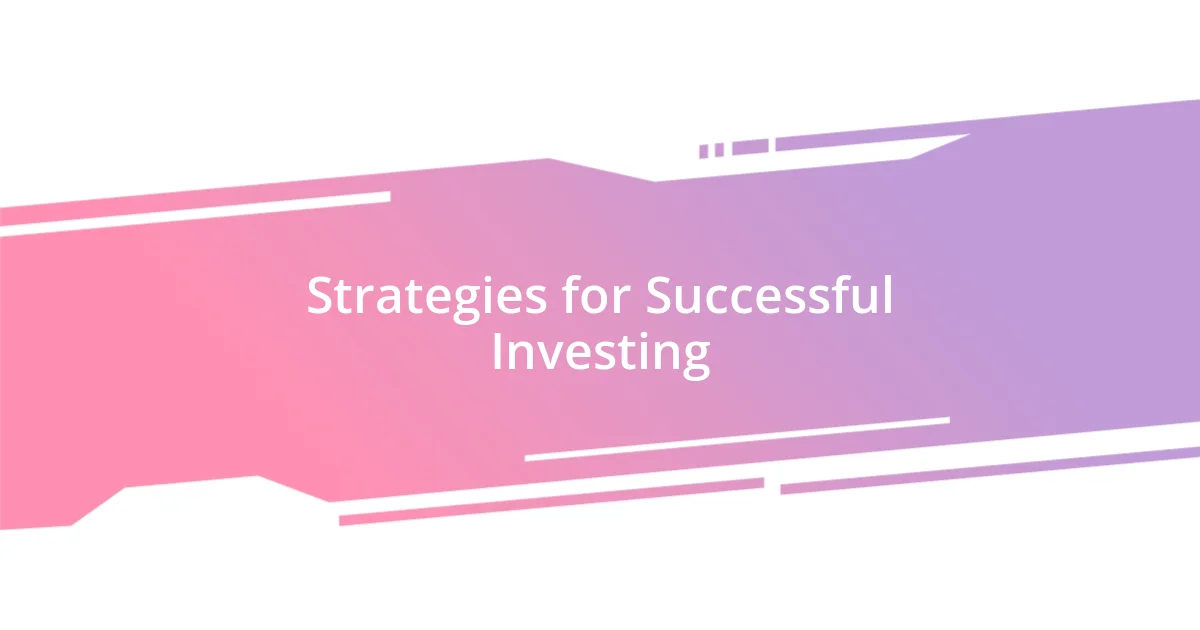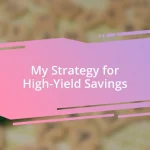Key takeaways:
- Alternative investments, including real estate, hedge funds, and commodities, offer benefits like diversification, potential for high returns, and unique opportunities beyond traditional markets.
- Key considerations for investing in alternatives include assessing risk tolerance, understanding liquidity requirements, and conducting thorough due diligence to align investments with financial goals.
- Successful investing strategies emphasize diversification, patience in market fluctuations, and establishing clear entry and exit strategies to manage investments effectively.

Understanding Alternative Investments
Alternative investments refer to financial assets that fall outside the traditional categories of stocks, bonds, and cash. I remember when I first learned about them; it felt like unlocking a hidden door to a world of opportunities. Have you ever felt the excitement of exploring something unfamiliar that could potentially yield higher returns?
These investments encompass a variety of asset classes, such as real estate, commodities, hedge funds, and private equity. I’ve dabbled in real estate myself, and I was amazed at how breaking away from conventional investments not only diversified my portfolio but also added layers of complexity and potential rewards. Isn’t it fascinating how alternative investments can sometimes provide a hedge against market volatility?
Emotional insight plays a significant role in choosing alternative investments. For me, it was the thrill of venturing into something unconventional that made the experience rewarding. What drives your investment decisions? Understanding your motivations can enrich your perspective on alternative investments, helping you navigate this diverse landscape more confidently.

Benefits of Alternative Investments
Alternative investments come with a unique set of benefits that can be incredibly appealing. I remember the first time I invested in a small private equity project. The thrill of being part of something innovative was invigorating, and it opened my eyes to how these investments can operate independently of traditional market fluctuations. This independence often leads to reduced correlation with conventional asset classes, which can effectively manage risk in a portfolio.
Here are some key benefits I’ve observed:
- Diversification: They often have low correlation with stocks and bonds, helping to spread risk across different asset types.
- Potential for High Returns: Certain alternative investments, such as venture capital, can yield higher returns compared to traditional options.
- Inflation Hedge: Assets like real estate often increase in value over time, providing a safeguard against inflation.
- Access to Unique Opportunities: Investing in niche markets or private companies can offer uncommon opportunities that traditional markets don’t provide.
- Income Generation: Some alternative investments, like real estate, can produce consistent cash flow, which is attractive for investors seeking passive income.
Engaging with these assets has not only diversified my financial exposure but has also instilled a sense of adventure in my investment journey. It’s fascinating to think how each choice shapes my financial future. Do you feel excited about the potential that lies beyond stock charts and bond yields?

Types of Alternative Investments
Diving deeper into the various types of alternative investments reveals a captivating landscape. For instance, real estate is not just about properties; it embodies a tangible way to create wealth. I still recall the joy of attending my first property auction, the energy in the room was electric, and I felt an exhilarating mix of anxiety and excitement as I raised my paddle for my first bid. My experience taught me that real estate can serve as both a long-term investment and a source of immediate rental income. Isn’t it thrilling to think about investing in something you can physically see and interact with?
Another intriguing category is hedge funds, which are often shrouded in mystery. I’ve noticed that they are typically aimed at wealthy investors and use advanced strategies to generate returns, employing techniques like short-selling and leverage. When I first explored the concept of hedge funds, I felt like I was peering into an exclusive club—it’s fascinating how they can navigate market fluctuations so deftly. I’ve realized that while they can provide exceptional returns, the fees and risks involved may not suit every investor’s appetite.
Commodities, like gold and oil, represent another alternative investment that captures my interest. Investing in commodities can feel like a hedge against economic downturns. I remember during a volatile market period when I decided to allocate a small portion of my portfolio to gold. Watching its price fluctuate alongside global news gave me a sense of connection to the world economy. It made me consider how these tangible assets can serve as a safety net in uncertain times.
| Type of Investment | Description |
|---|---|
| Real Estate | Investing in physical properties for appreciation and rental income. |
| Hedge Funds | Private investment funds using advanced strategies to generate returns. |
| Commodities | Investments in tangible assets like gold, oil, or agricultural products. |

Key Considerations for Investing
When considering alternative investments, one of the most vital aspects to evaluate is your risk tolerance. I distinctly recall a time when I was tempted to jump into a hedge fund investment, drawn in by the promise of high returns. However, I paused to reflect on my comfort level with the operational risks involved—this moment of introspection helped me avoid potential heartache. It’s essential to ask yourself, how much volatility can you handle without losing sleep at night?
Liquidity is another factor that must not be overlooked. Unlike stocks, which you can sell at the click of a button, many alternative investments require holding your assets for a considerable time. I remember grappling with this when I invested in real estate; there were moments when immediate cash flow would have been appealing. I learned that understanding the liquidity profile of each investment can help shape your financial strategy. Are you prepared to invest for the long haul, or do you need the flexibility to access your funds quickly?
Furthermore, the due diligence process cannot be understated. It can be easy to get swept away by the excitement of unique investment opportunities. I still vividly remember my first foray into a crowdfunding venture; the cool technology behind it was incredible, but it also masked risks that I didn’t fully grasp at the time. Conducting thorough research on each alternative investment—not just what they are, but how they align with your overall financial goals—can be the difference between success and regret. What have your past investments taught you about the importance of diligence?

How to Evaluate Investments
Evaluating investments is like crafting a recipe; you need the right ingredients for success. One essential element is to assess the potential return on investment (ROI). I remember the first time I calculated ROI for a startup I was interested in. The numbers danced on the page, and I felt both thrilled and cautious. Understanding how much profit I could realistically expect helped me manage my expectations and decide whether to dip my toes in. What about you—how do you factor in potential returns when considering an investment?
Another critical point is to scrutinize the underlying fundamentals of the investment. For instance, when I explored a promising venture in renewable energy, I dug deep into their business model and market landscape. The initial excitement quickly transformed into a more grounded perspective when I realized some assumptions were overly optimistic. It’s so easy to get caught up in the allure of a buzzworthy idea. Have you ever found yourself caught in the hype, only to discover that the foundation beneath it wasn’t as sturdy as you thought?
Finally, I believe it’s vital to consider the track record of the people managing the investment. When I invested in an art fund, I was captivated by the concept, but I also made it a point to learn about the fund managers’ experience and past performance. That heightened my confidence in their expertise. It made me think—who’s steering the ship? Their history can reveal a lot about potential future outcomes. What lessons have you gathered from past experiences that inform your evaluation process?

Strategies for Successful Investing
When it comes to investing successfully, diversifying your portfolio is crucial. I learned this firsthand during a challenging market downturn when several of my stocks plummeted. In that moment, I wished I had spread my investments across more asset classes. It made me appreciate how diversification can cushion the blow when one sector underperforms. What strategies do you use to ensure your investment mix is balanced?
Another strategy is to remain patient and resist impulsive decisions. There was a time when I sold off a promising investment out of fear after reading some negative news. In hindsight, the company rebounded beautifully within a few months. This taught me the value of holding firm and sticking to a long-term perspective, even when market jitters stir uncertainty. Have you experienced a similar moment where patience paid off?
Lastly, developing a clear exit strategy is essential. I recall a real estate investment where I didn’t have a solid plan for when I’d sell. As I navigated the ups and downs of property values, it became evident that a predefined exit could have saved me time and emotional stress. I have since made it a point to clearly identify my entry and exit points for every investment. How do you decide when it’s time to let go?














